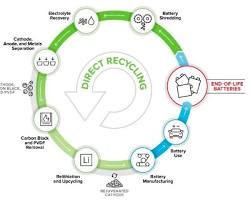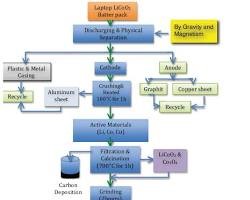Lithium-ion batteries are a key component of the transition to a clean energy future. They are used in a wide variety of applications, including electric vehicles, laptops, and smartphones. However, as the demand for lithium-ion batteries grows, so does the need for sustainable recycling methods.
Traditional methods of lithium-ion battery recycling are often energy-intensive and environmentally harmful. They can also be expensive and inefficient. However, there have been a number of advances in lithium-ion battery recycling technology in recent years. These advances have made recycling more efficient, cost-effective, and environmentally friendly.
One of the most promising advances in lithium-ion battery recycling is the development of direct cathode recycling. This process involves removing the cathode material from the battery and then reconditioning it for reuse. This eliminates the need to extract the metals from the cathode material, which is a time-consuming and energy-intensive process.
Direct cathode recycling process
Another promising advance is the development of hydrometallurgical processes. These processes use aqueous solutions to extract the metals from the battery material. Hydrometallurgical processes are typically more efficient and environmentally friendly than traditional pyrometallurgical processes.
Hydrometallurgical processes for lithium-ion battery recycling
In addition to these advances, there are a number of other promising technologies being developed for lithium-ion battery recycling. These include:
- Biohydrometallurgy: This process uses microorganisms to extract the metals from the battery material.
- Mechanical separation: This process uses physical methods to separate the different components of the battery.
- Solvent extraction: This process uses solvents to extract the metals from the battery material.
These advances in lithium-ion battery recycling technology have the potential to make recycling more efficient, cost-effective, and environmentally friendly. This will help to ensure that lithium-ion batteries can be a sustainable part of the clean energy future.
In addition to the advances in recycling technology, there are a number of other factors that are driving the growth of the lithium-ion battery recycling industry. These include:
- The increasing demand for lithium-ion batteries: The demand for lithium-ion batteries is growing rapidly as the use of electric vehicles and other electronic devices increases.
- The environmental impact of lithium-ion batteries: Lithium-ion batteries contain hazardous materials that can contaminate the environment if they are not disposed of properly.
- The economic value of recycling lithium-ion batteries: Lithium-ion batteries contain valuable metals that can be recovered and reused.
As a result of these factors, the lithium-ion battery recycling industry is expected to grow significantly in the coming years. This will help to ensure that lithium-ion batteries are a sustainable part of the clean energy future.
Citation
https://cen.acs.org/environment/recycling/Lithium-ion-battery-recycling-goes/101/i38

